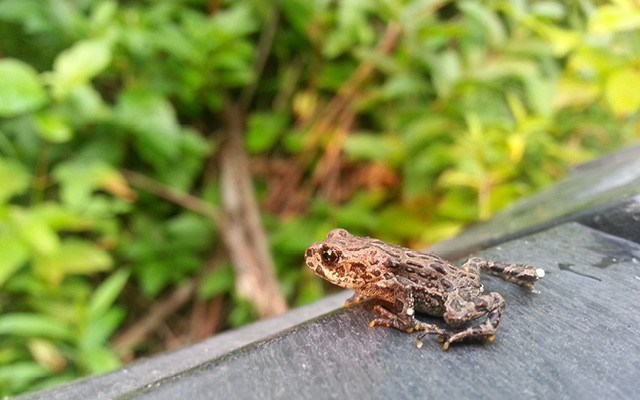Thousands of Western toad tadpoles will soon begin hopping to a new life as Whistler's annual Western toad migration starts in Lost Lake Park.
The migration happens yearly in Whistler near the end of July and typically lasts two or three weeks. The toads begin migrating from the beaches at Lost Lake to the surrounding forests. During peak hours, an estimated 1,800 toads per hour can cross the beach trail.
During the migration, the toads must cross trails, lawns and roads full of pedestrians and vehicles.
Historically, many tiny toads have been crushed by cars and people during their migration; because of this, trails to Lost Lake are commonly closed during the migration period (though there are no closures in effect for Lost Lake Park at this time. Check whistler.ca/toads for updates).
Weather conditions can significantly alter their behaviour, but the toadlets tend to be most active in crossing areas from 8 to 11 a.m. and 5 to 7 p.m. during migration.
Western toads are native to British Columbia and are sensitive to environmental changes. Human activities—especially roads and urban development that compromise forests and wetlands—are leading to the loss of suitable habitats and the creation of migration barriers for amphibians. Western toad populations are particularly vulnerable during the tadpole and “toadlet” life stages.
The Resort Municipality of Whistler (RMOW) recently built new infrastructure to help migrating toads pass safely through the park. In 2020, a toad underpass was constructed under the Valley Trail. In the spring of 2021, a second underpass was installed under the Lost Lake Loop Trail between Lost Lake Beach and Barking Bay.
Underpasses have also been strategically placed to allow toads to follow preferred migration routes without crossing high-traffic trail networks. In addition to tunnels, the RMOW installed a new log retaining wall along Lost Lake beach to discourage toads from migrating onto park lawn areas where historic mortality numbers have been very high.
The municipality requests that people step carefully and walk bicycles through the Lost Lake area as the toads are no bigger than a dime and can be easily crushed underfoot.
The RMOW's environmental technicians and volunteers maintain a presence to monitor the migration and help the tiny toads move safely from the beach to the forest areas.
Those who would like to volunteer to help out with the 2022 Western toad migration can email [email protected].




